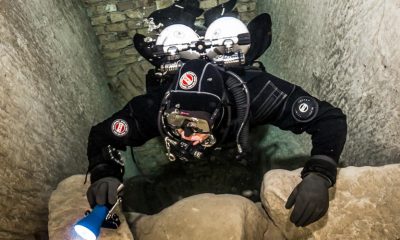News
Mind your Language: TV Presenters back Bite-Back’s call for responsible shark journalism
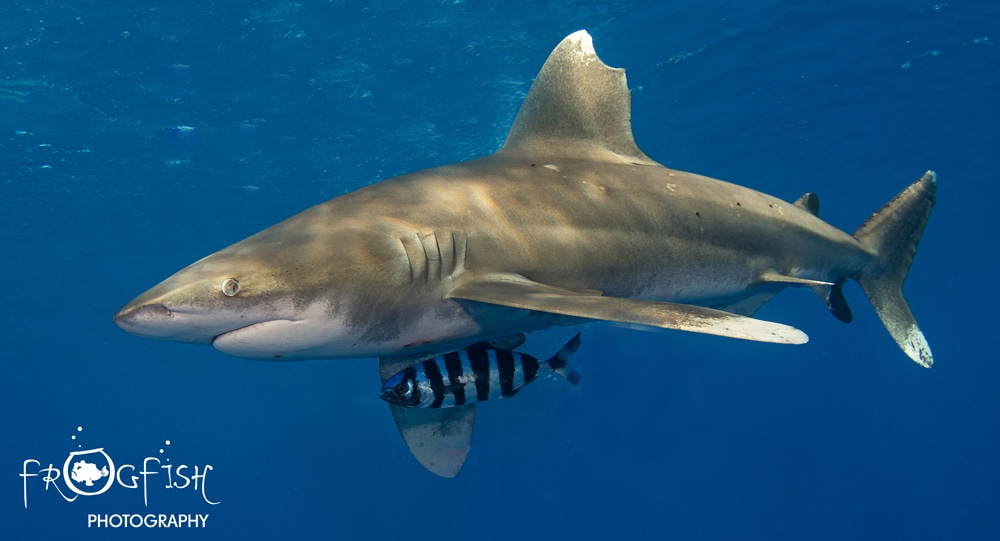
TV presenters Steve Backshall and Hugh Fearnley-Whittingstall head a growing list of high profile individuals supporting a call for responsible shark journalism by Bite-Back Shark & Marine Conservation.
The UK charity says that decades of news headlines labelling sharks as ‘monsters’, ‘killers’ and ‘beasts’ — language typically used to describe rapists, terrorists and paedophiles — has created a climate of fear and loathing that is thwarting shark conservation initiatives.
Bite-Back’s view is underpinned by a recent survey that revealed 46% of Brits think that sharks are terrifying than spiders, snakes and rodents combined and that 64% would prefer them not to exist.
TV presenter and patron of Bite-Back Shark & Marine Conservation, Steve Backshall, said: “It’s time that journalists understand how these sensational headlines and falsehoods are perpetrating a hatred of sharks that justifies their boundless slaughter. As such, I think the media is complicit in one of the greatest deliberate exterminations in our planet’s history.”
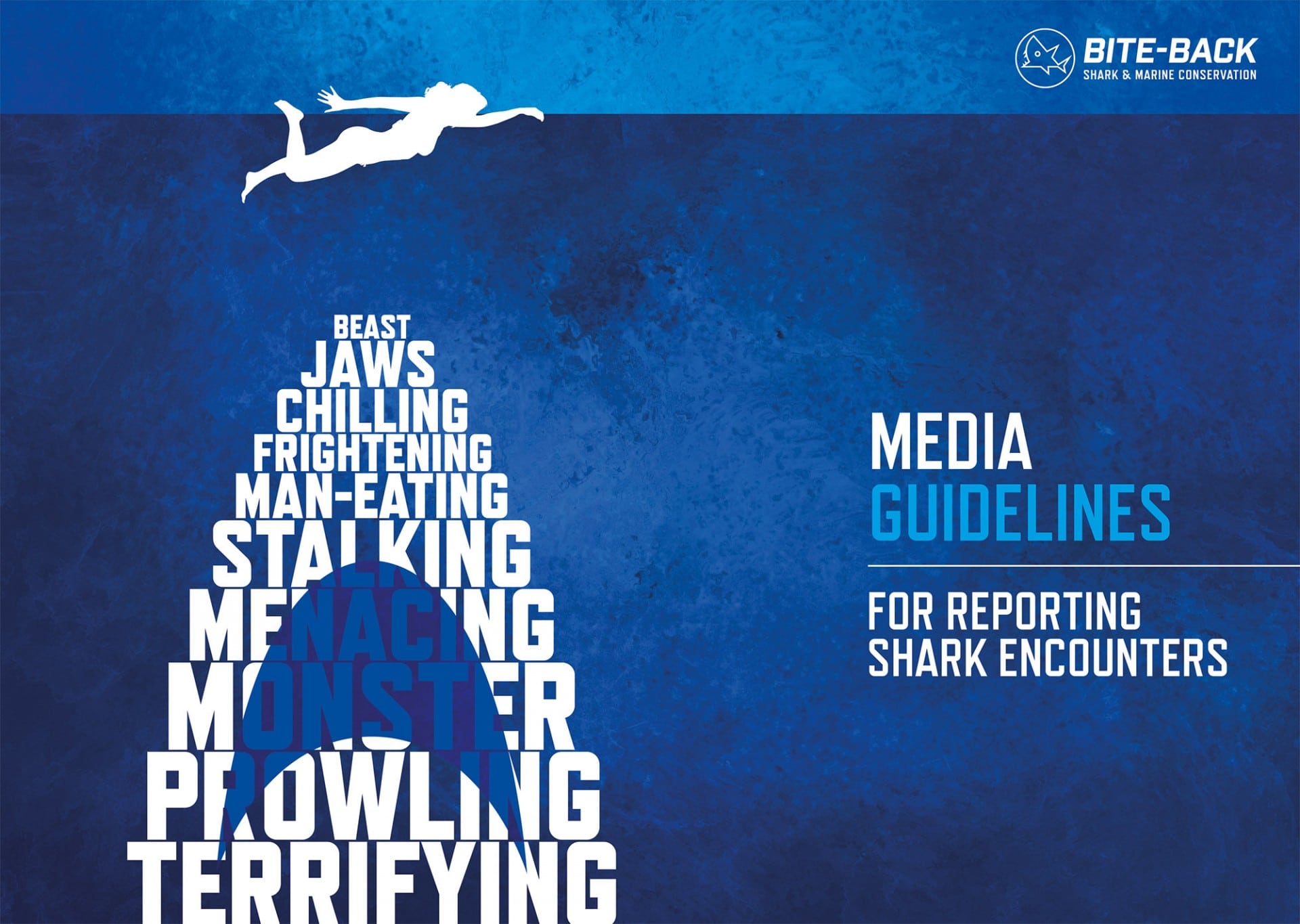
An estimated 73 million sharks are slaughtered every year and Britain ranks in the top 25 shark fishing nations in the world. As a result, populations of key shark species including the great white, hammerhead, oceanic whitetip and thresher have fallen by 90% in the past 60 years.
Chef and campaigner Hugh Fearnley-Whittingstall said: “Sharks are getting a bad press they simply don’t deserve. Decades of sensational headlines have stripped sharks of their status as vital marine species and all too often left the public frightened for little reason. I’d welcome any move by the media to fairly report sharks rather than default to tired and inaccurate click bait captions.”
In the past six weeks most UK print, online and broadcast media outlets have run shark stories from around the world and closer to home. Many have used language including ‘ferocious’, ‘terrifying’, ‘killer’, ‘invasion’, ‘blood-thirsty’, ‘lurking’ and ‘deadly’ to describe sharks despite the fact that typically only six people a year worldwide die from shark encounters, whereas dogs kill around 25,000. On average British cows kills more people each year than all the sharks in the world.
Bite-Back has also achieved support for this appeal from ocean ambassador Wendy Benchley, widow of Peter Benchley the author of JAWS. She said: “While the cinema is a place of entertainment, newspapers and media channels are a place for facts. For far too long the news press have blurred the boundaries between fact and fiction and got away with reporting sharks as man-eating monsters when it’s simply not true. I believe this constant portrayal of sharks as the bad guys rather than our ocean heroes is hindering shark conservation efforts.”
In a bid to make Britain the first western country to ban shark product by 2022, Bite-Back has successfully campaigned for ASDA, Iceland Foods and MAKRO to end the sale of shark steaks. It has also spearheaded an 82% fall in the number of UK restaurants selling shark fin soup and prompted Holland & Barrett to end the sale of shark cartilage capsules.
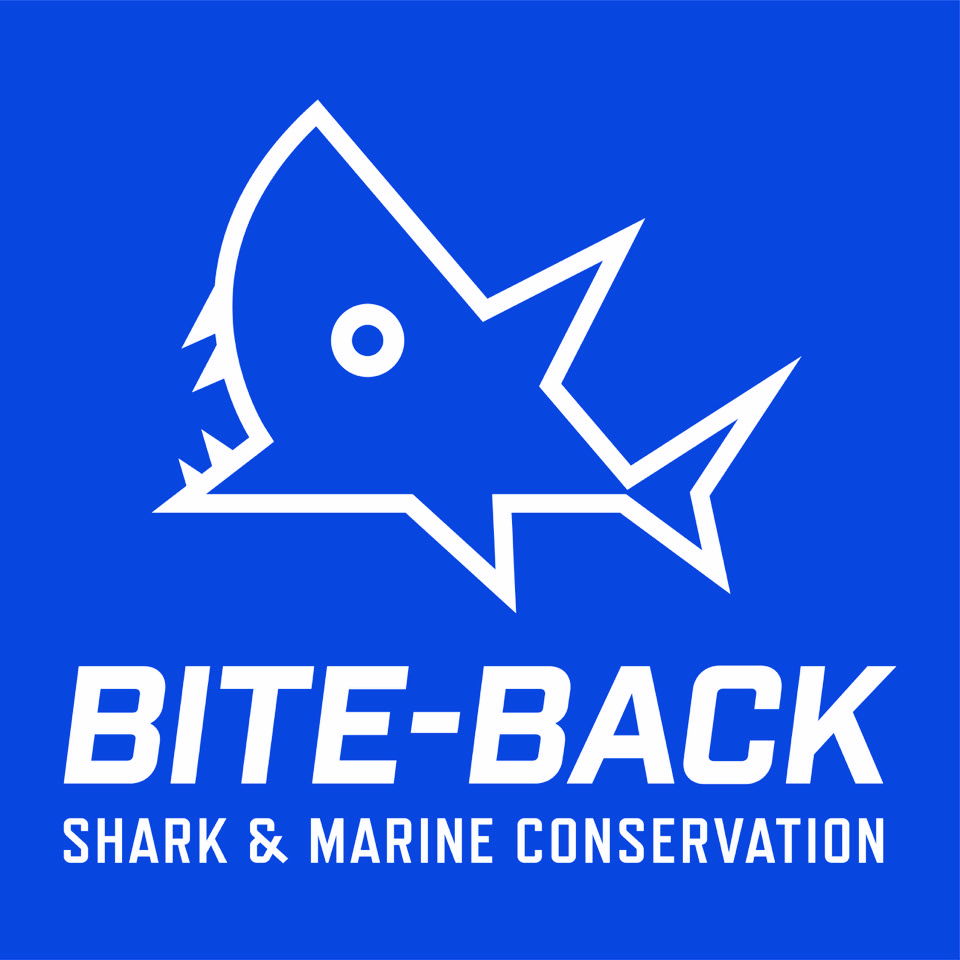 Campaign director for Bite-Back Shark & Marine Conservation, Graham Buckingham, says: “No other creature on this planet is described with inflammatory language intended to spread fear, panic and hate. As a result, the mere presence of a shark in the sea prompts sensational, attention-grabbing headlines. We’re keen to work with the press and reach a point where shark encounters are reported accurately and fairly and in a way that doesn’t jeopardise our blue planet.”
Campaign director for Bite-Back Shark & Marine Conservation, Graham Buckingham, says: “No other creature on this planet is described with inflammatory language intended to spread fear, panic and hate. As a result, the mere presence of a shark in the sea prompts sensational, attention-grabbing headlines. We’re keen to work with the press and reach a point where shark encounters are reported accurately and fairly and in a way that doesn’t jeopardise our blue planet.”
The charity now plans to present its 15 page media guideline document on best practice for reporting shark encounters to all the major news channels in the UK.
Read more about shark conservation issues visit www.bite-back.com
Marine Life & Conservation
Double Bubble for Basking Sharks

 The Shark Trust is excited to announce that, for two more days only, all donations, large or small, will be doubled in the Big Give Green Match Fund!
The Shark Trust is excited to announce that, for two more days only, all donations, large or small, will be doubled in the Big Give Green Match Fund!
Donate to Basking in Nature: Sighting Giants
The Shark Trust is hoping to raise £10k which will be doubled to £20k. This will go towards Basking in Nature: Sighting Giants. And they need YOUR help to reach they’re goal.
The Shark Trust’s citizen science project is to monitor and assess basking sharks through sightings; encouraging data collection, community engagement, and promoting nature accessibility. This initiative aims to enhance health and wellbeing by fostering a deeper connection with British Sharks.
Campaign Aims
- Increase citizen science reporting of Basking Sharks and other shark sightings to help inform shark and ray conservation.
- Provide educational talks about the diverse range of sharks and rays in British waters and accessible identification guides!
- Create engaging and fun information panels on how to ID the amazing sharks and rays we have on our doorstep! These can be used on coastal paths around the Southwest. With activities and information on how you can make a difference for sharks and rays!
- Promote mental wellbeing through increasing time in nature and discovering the wonders beneath the waves!
Donate, and double your impact. Click Here
Blogs
Northern Red Sea Reefs and Wrecks Trip Report, Part 1: Welcome to Adventure
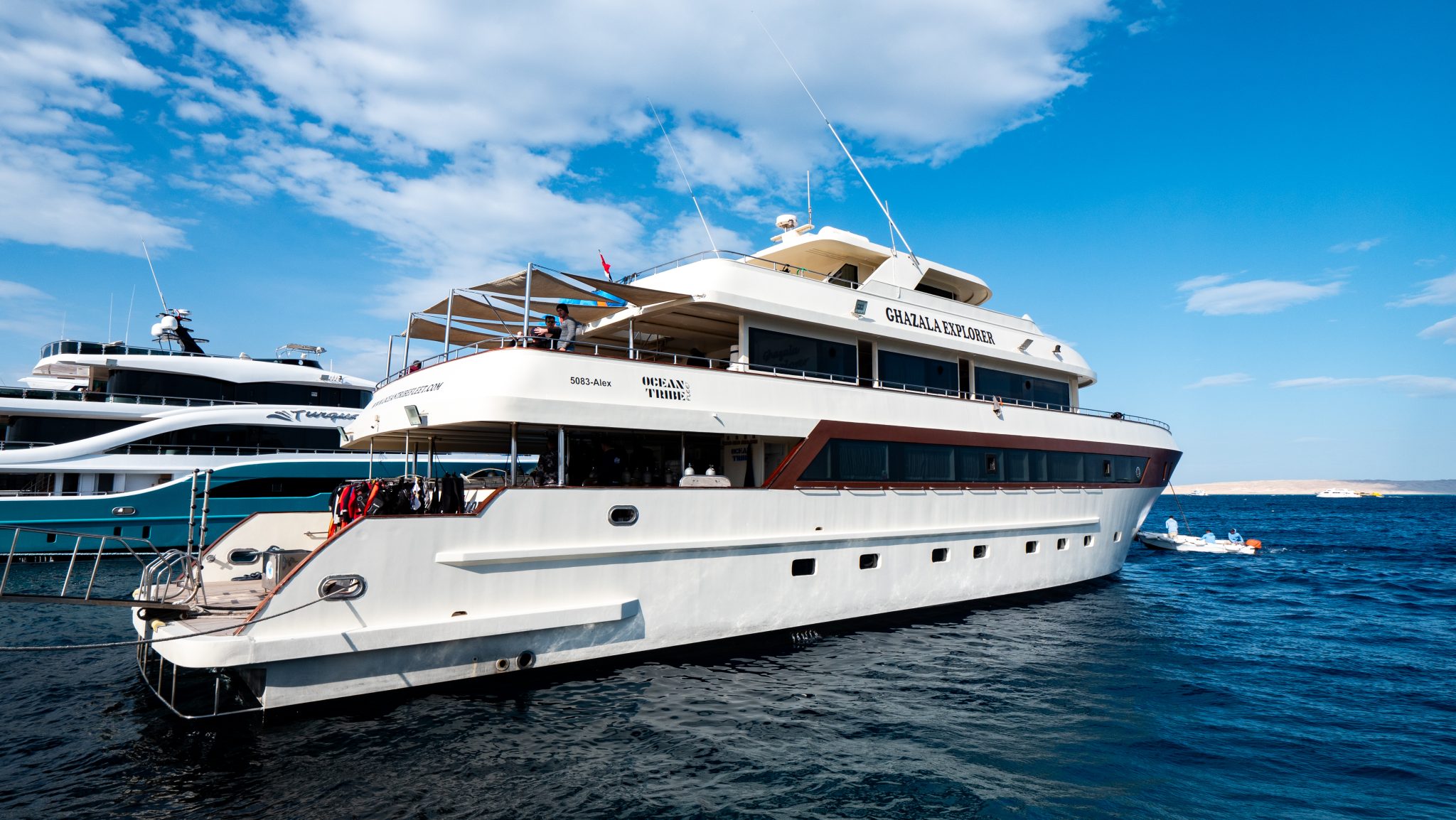
Jake Davies boards Ghazala Explorer for an unforgettable Red Sea diving experience…
The Red Sea is known for its range of dives, from bright, colourful reefs with a diverse array of reef species to world-famous wrecks scattered along its numerous atolls. The reefs and wrecks of the North Red Sea are one of the best ways to experience many of these.
Organised by dive tour operator specialist Scuba Travel, Ghazala Explorer was going to be home for the week for this exciting trip, a 37m steel-hulled vessel with top-class reviews by previous guests.
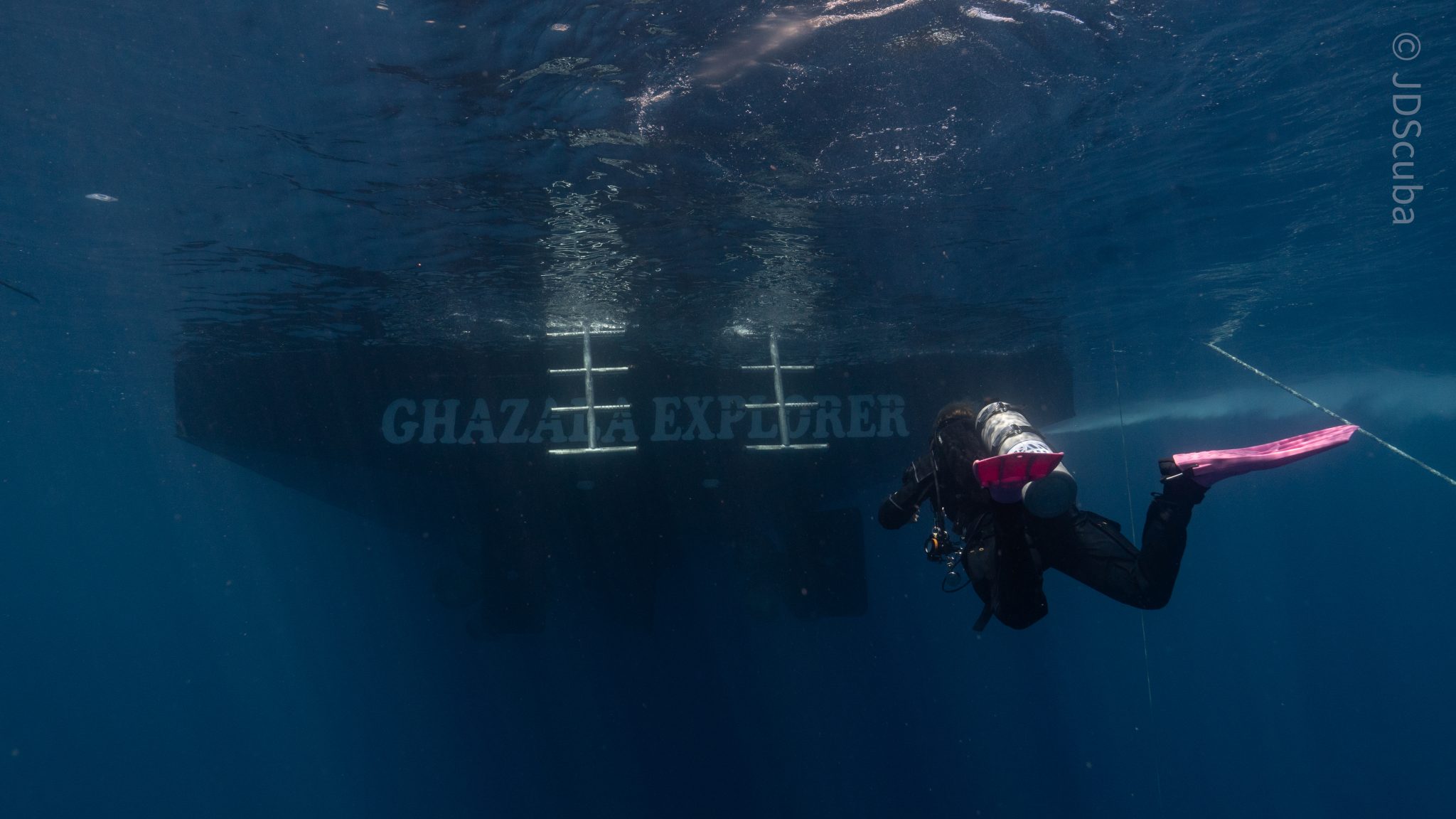
Departing from Hurghada, the plans were to head north for the first couple of days, including check dives on Global reefs, before then heading to see a few of the wrecks at Abu Nuhas reef. Then we would head across the Gulf of Suez into Ras Mohammed National Park to see what are considered to be some of the best reef dives in the Red Sea. From there, we would head to the Strait of Tiran for a day, then head back south to dive the world-famous wreck and one of the trip’s highlights: the SS Thistlegorm. This would include a night dive prior to heading back for the final day’s diving around Hurghada before heading back to port.
Arriving from Gatwick into Hurghada late in the evening, the Scuba Travel rep was waiting for arrivals ready to take us all to the Ghazala Explorer, docked in Hurghada’s New Marina. Stepping onboard, the high-quality and spacious deck spaces and interior provided an instant sense of comfort. There was a friendly welcome by the crew and guides. After some food, it was time for the boat briefing, which was detailed and covered all the important safety aspects of the vessel and procedures. The kit was then set up in the allocated spaces, and the spacious tables in the interior provided the perfect place to build up my camera ahead of the week’s trip. As soon as everything was done, it was time to head to the cabin to get some rest before an early start for a check dive.
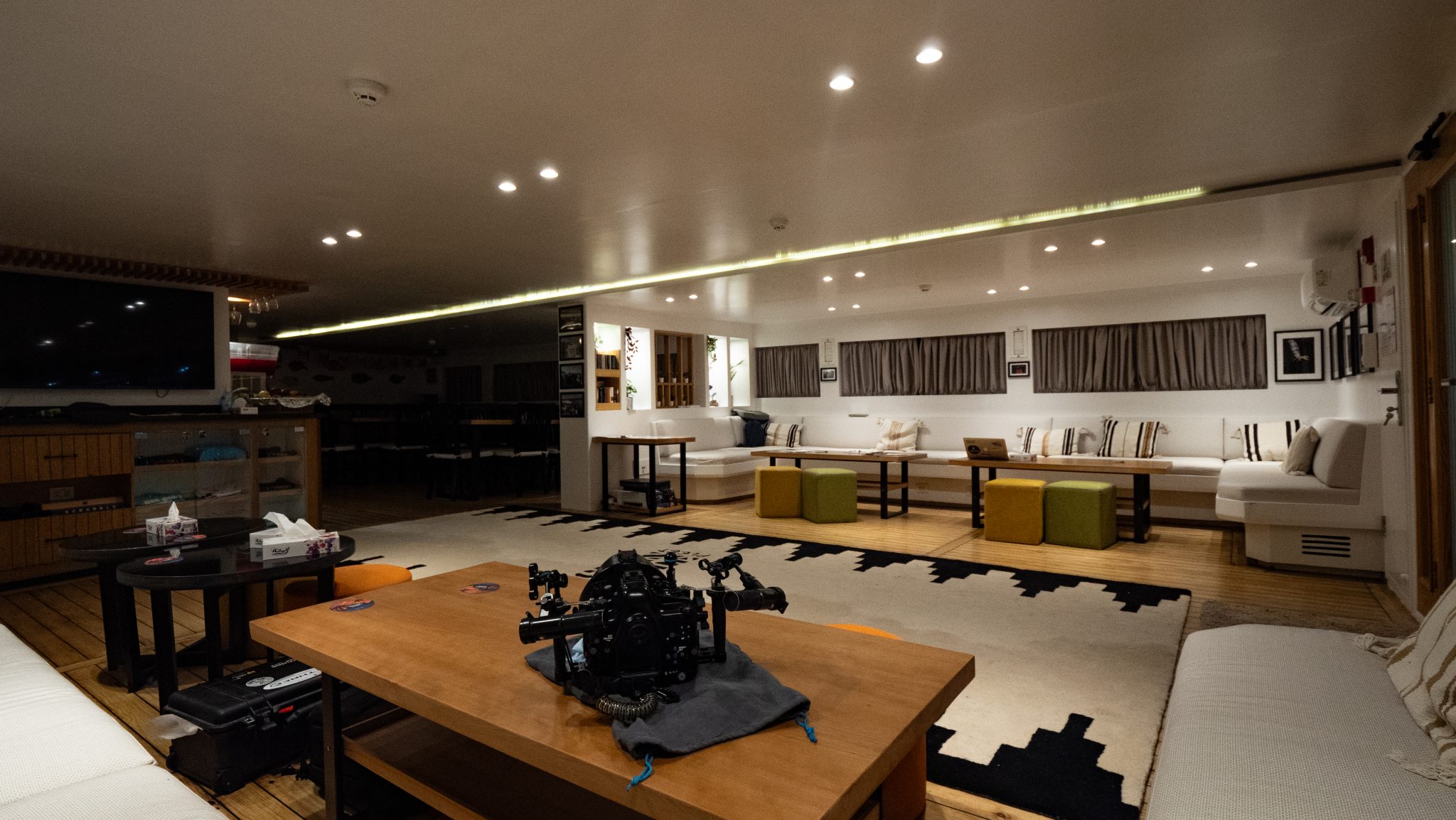
The northerly wind provided a chop, but it wasn’t felt as the steel hull of the vessel cut through each wave. By mid-morning, we were moored up at the reef at Gobal Island, sheltered from the chop on the other side. With Ahmed providing a detailed briefing, it was time to kit up and get in the water to explore some of the reefs below during the check dive. It’s always exciting to stand on the stern of the boat, looking into the clear blue water before taking a stride entry to enter the colourful coral scenery below.
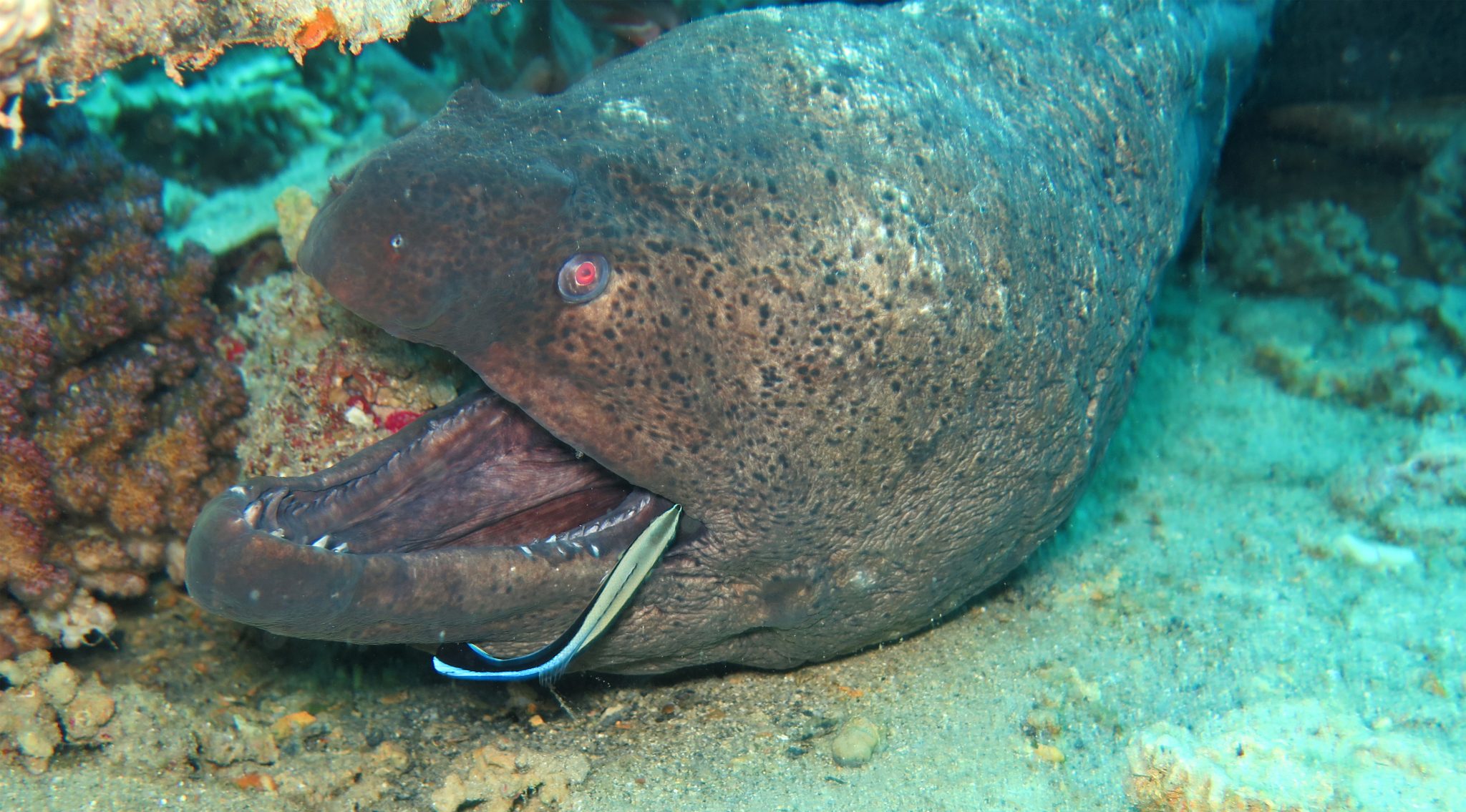
Like most of the dives on coral reefs in the Red Sea, the colours and busyness of the reefs were great to see. It was great to be back on the reefs, taking the time to watch the many species which make up the Red Sea ecosystems before picking out a few to film and photograph. The time flies by as you are constantly engaged with the surroundings, and then before I knew it, it was time to head back onboard, where everyone coming back from the water had big smiles and were full of excitement and anticipation for the rest of the week.
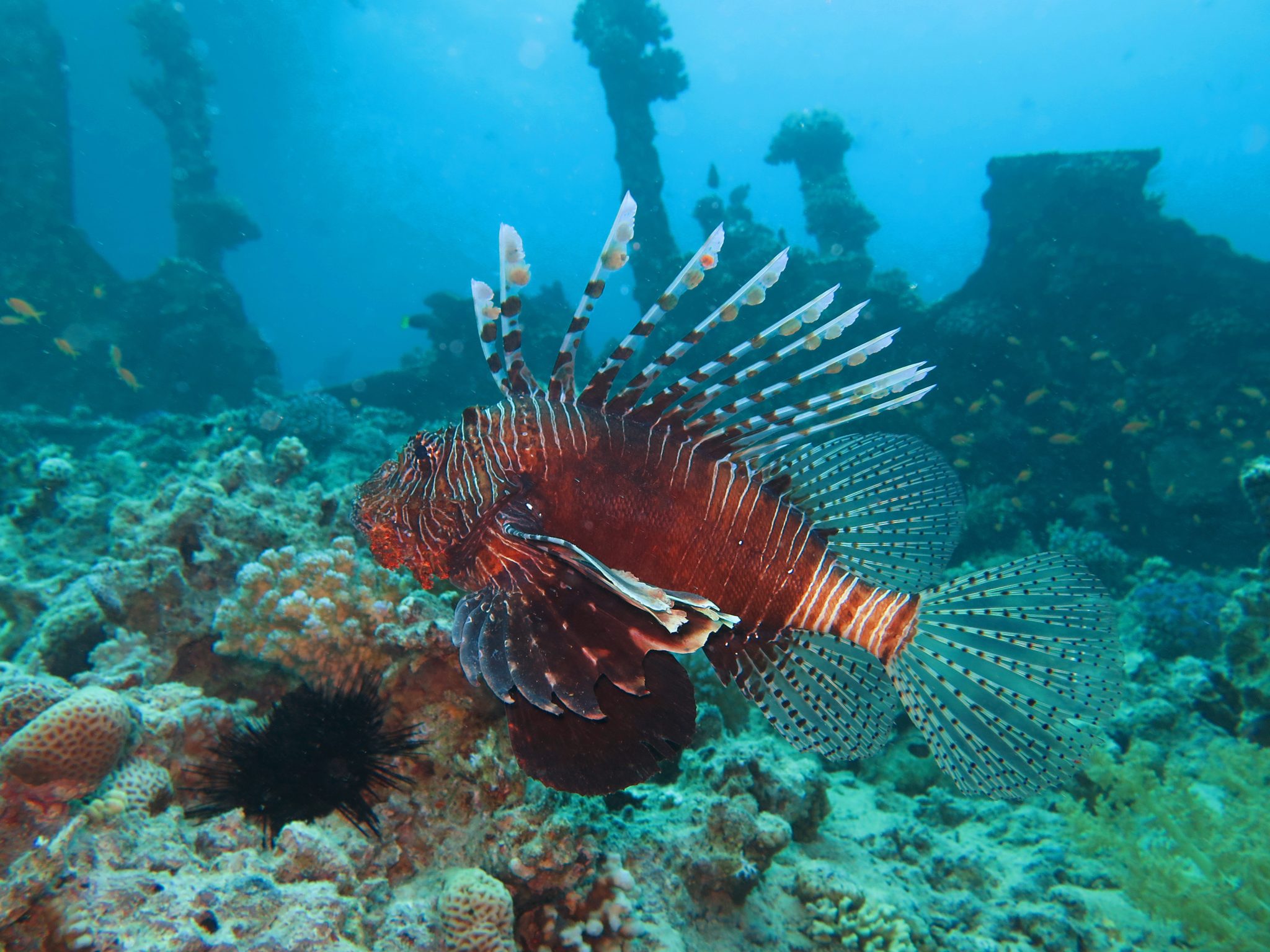
The next two dives, which included the night dive, were on the wreck of the barge, where very little remains act as an artificial reef for many species, which included a few perfectly hidden large stonefish and a crocodile fish camouflaging on the sand beneath the hull. Looking up though was the highlight of the dive, as a squad of squid could be seen mid-water, dancing around. Ascending slowly and calmly, I was able to position myself amongst the squad for the opportunity to get a few close-ups of this great species. Shortly after, the squid were then accompanied by a shoal of halfbeaks just below the surface. Everywhere was just full of life!
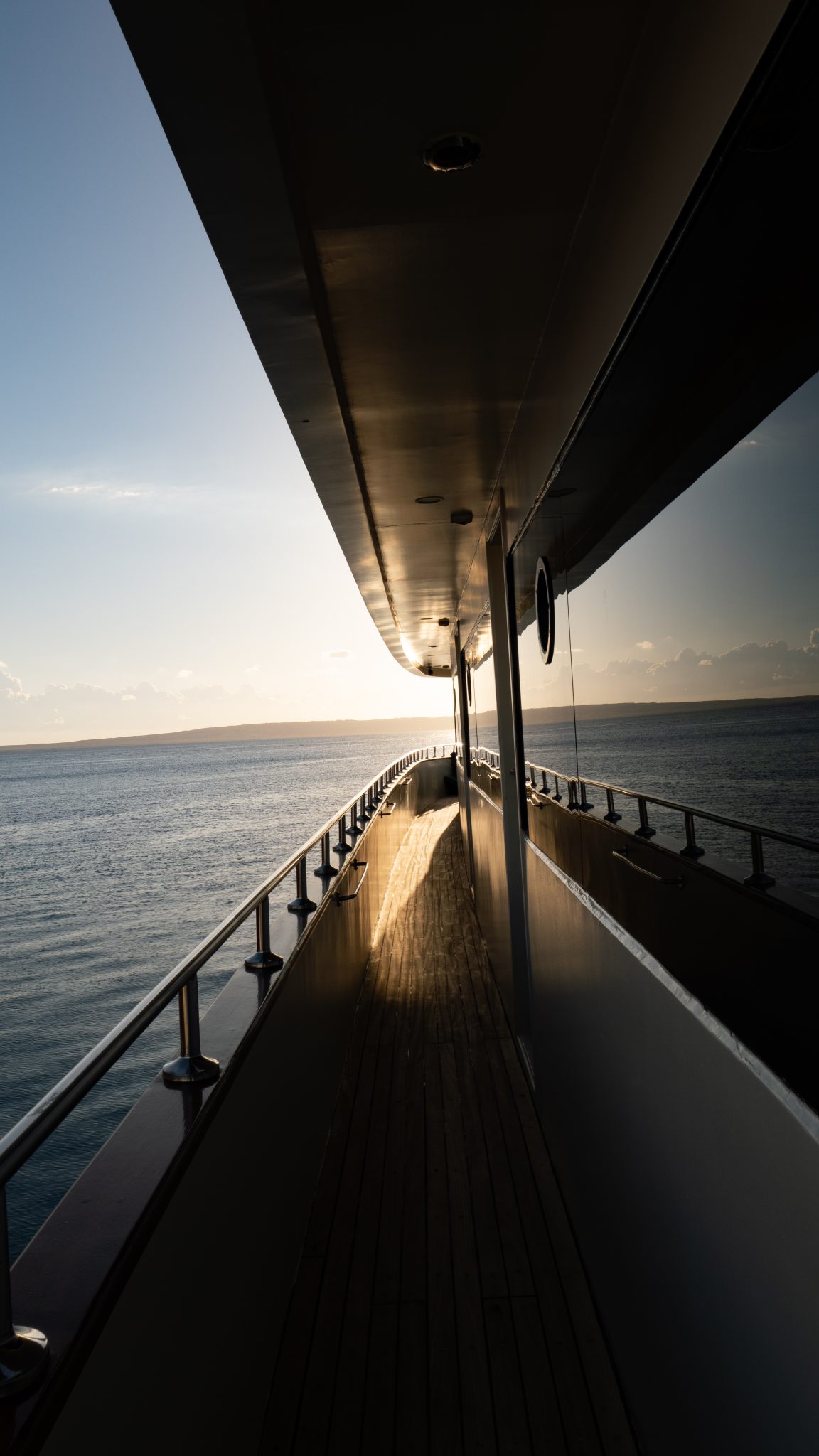
After some afternoon snacks, and as part of the safety protocols of the vessel, it was time to practice an emergency drill to put the briefings into action. The fire alarm rang, and we then had to carry out a full drill of getting the life jackets and using the closest emergency exits to then gather at the muster point on top deck where we would then have a run-through of the life rafts. The drill was great to do and I thought it was a really important part of the boat’s safety, as it was an opportunity to use the emergency exits to ensure a safe and effective evacuation, while also convening at the muster station to go through different scenarios and become familiar with some of the kit used during these emergencies.
Check in for Part 2 from Jake tomorrow!
To find out more about the Northern Red Sea reef and wrecks itineraries aboard Ghazala Explorer, or to book, contact Scuba Travel now:
Email: dive@scubatravel.com
Tel: +44 (0)1483 411590
Photos: Jake Davies / Avalon.Red
-

 News3 months ago
News3 months agoHone your underwater photography skills with Alphamarine Photography at Red Sea Diving Safari in March
-

 News2 months ago
News2 months agoCapturing Critters in Lembeh Underwater Photography Workshop 2024: Event Roundup
-

 Marine Life & Conservation Blogs2 months ago
Marine Life & Conservation Blogs2 months agoCreature Feature: Swell Sharks
-

 Blogs2 months ago
Blogs2 months agoMurex Resorts: Passport to Paradise!
-

 Blogs2 months ago
Blogs2 months agoDiver Discovering Whale Skeletons Beneath Ice Judged World’s Best Underwater Photograph
-

 Gear Reviews2 months ago
Gear Reviews2 months agoGear Review: Oceanic+ Dive Housing for iPhone
-

 Marine Life & Conservation2 months ago
Marine Life & Conservation2 months agoSave the Manatee Club launches brand new webcams at Silver Springs State Park, Florida
-

 News3 months ago
News3 months agoWorld’s Best Underwater Photographers Unveil Breathtaking Images at World Shootout 2023













